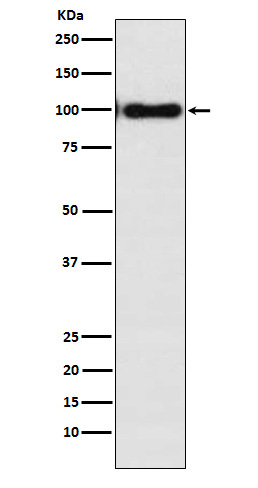
| WB | 咨询技术 | Human,Mouse,Rat |
| IF | 咨询技术 | Human,Mouse,Rat |
| IHC | 咨询技术 | Human,Mouse,Rat |
| ICC | 1/50-1/200 | Human,Mouse,Rat |
| FCM | 1/20-1/100 | Human,Mouse,Rat |
| Elisa | 咨询技术 | Human,Mouse,Rat |
| Aliases | CDHF3; Desmocollin3; Desmocollin4; DSC; DSC1; DSC2; DSC3; DSC4; HTCP;;Desmocollin 3 |
| WB Predicted band size | 100 kDa |
| Host/Isotype | Rabbit IgG |
| Antibody Type | Primary antibody |
| Storage | Store at 4°C short term. Aliquot and store at -20°C long term. Avoid freeze/thaw cycles. |
| Species Reactivity | Human,Mouse,Rat |
| Immunogen | A synthesized peptide derived from human Desmocollin 3 |
| Formulation | Purified antibody in PBS with 0.05% sodium azide,0.05% BSA and 50% glycerol. |
+ +
以下是关于Desmocollin 3(DSC3)抗体的3篇代表性文献摘要:
---
1. **"Desmocollin 3 is expressed in basal and squamous cell carcinomas and inversely correlates with tumor progression"**
*Kurzen, H., et al. (2003)*
该研究利用DSC3抗体进行免疫组化分析,发现DSC3在皮肤基底细胞癌和鳞状细胞癌中高表达,但随着肿瘤恶性程度升高,其表达显著下调,提示DSC3可能作为抑制侵袭性生长的标志物。
2. **"Autoantibodies against desmocollin-3 in pemphigus vulgaris"**
*Amagai, M., et al. (2006)*
通过DSC3特异性抗体检测,发现寻常型天疱疮患者的自身抗体会靶向DSC3蛋白,破坏细胞间黏附连接,导致皮肤表皮层水疱形成,为疾病机制提供了关键证据。
3. **"Desmocollin-3 is required for cell-cell adhesion in human epidermal keratinocytes"**
*Chitaev, N.A., & Troyanovsky, S.M. (1998)*
研究通过DSC3抗体阻断实验,证明DSC3在人类角质形成细胞的钙依赖性黏附中起核心作用,其缺失导致细胞间连接结构异常,影响表皮屏障功能。
---
以上文献均聚焦于DSC3抗体的应用,涵盖肿瘤生物学、自身免疫病机制及细胞黏附功能研究,方法涉及免疫组化、抗体阻断及临床样本分析。
Desmocollin 3 (DSC3) is a transmembrane glycoprotein belonging to the desmosomal cadherin family, primarily involved in cell-cell adhesion through desmosomes. These junctions are critical for maintaining tissue integrity, especially in mechanically stressed epithelia like the skin and heart. DSC3 is encoded by the *DSC3* gene and is one of four desmocollin isoforms (DSC1-4) with tissue-specific expression patterns. DSC3 is predominantly expressed in stratified and simple epithelial tissues, playing a key role in epidermal homeostasis and barrier function.
Antibodies targeting DSC3 are essential tools in studying desmosomal dynamics, epithelial biology, and diseases linked to cell adhesion defects. Autoantibodies against DSC3 are implicated in autoimmune blistering disorders, such as pemphigus vulgaris, where disrupted desmosomal adhesion leads to epidermal detachment. Researchers also use DSC3 antibodies to explore cancer biology, as altered DSC3 expression correlates with tumor progression and metastasis in certain carcinomas.
In the lab, DSC3 antibodies are employed in techniques like immunohistochemistry, Western blotting, and immunofluorescence to visualize protein localization, expression levels, and interaction networks. Monoclonal antibodies offer high specificity, while polyclonal versions may detect multiple epitopes. Recent studies highlight DSC3's potential as a diagnostic biomarker or therapeutic target, emphasizing the antibody's value in both basic research and clinical applications. Understanding DSC3's role through these antibodies continues to advance insights into epithelial disorders and cancer mechanisms.
×